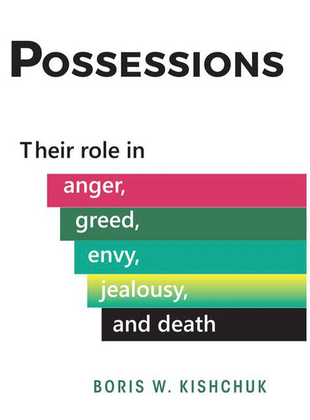LEARN ABOUT
Possessions: Their role in anger, greed, envy, jealousy and death

I have wondered throughout most of my life why people kill each other. Life is short. We all probably have had friends or family members who have died at an early age because of accidents or illness. We learn how precious life is. So why do people kill each other?
In the same vein we can ask why people become angry, why do people become envious, why do people become greedy, why do people become jealous and why do people start wars?
One common motivator and common denominator seems to be the desire to acquire possessions or to protect existing possessions.
Possessions come in many forms. We all need some possessions to live – such as shelter, warmth, food, clothing and companionship. But how much is enough?
Where does the urge to possess come from? A basic question about possessions is whether we are born with the desire to possess or do we learn as we grow up and mature? Does culture, self-uncertainty or fear influence our desire to possess? What do major religions say about possessions? How do we project our self-image with possessions? Do we need possessions to attain important achievements? And what are some of the consequences of an excessive desire for possessions?
I have in the book, by way of examples, attempted to answer these and other questions on possessions and their influence on our lives. The interplay between possessions and anger, greed, envy, jealousy, and conflict is examined by way of historical events.
In the same vein we can ask why people become angry, why do people become envious, why do people become greedy, why do people become jealous and why do people start wars?
One common motivator and common denominator seems to be the desire to acquire possessions or to protect existing possessions.
Possessions come in many forms. We all need some possessions to live – such as shelter, warmth, food, clothing and companionship. But how much is enough?
Where does the urge to possess come from? A basic question about possessions is whether we are born with the desire to possess or do we learn as we grow up and mature? Does culture, self-uncertainty or fear influence our desire to possess? What do major religions say about possessions? How do we project our self-image with possessions? Do we need possessions to attain important achievements? And what are some of the consequences of an excessive desire for possessions?
I have in the book, by way of examples, attempted to answer these and other questions on possessions and their influence on our lives. The interplay between possessions and anger, greed, envy, jealousy, and conflict is examined by way of historical events.
"I love games: card, word, trivia, etc., and I’ve usually been fortunate to have someone in my circle who also enjoys a friendly but spirited competition. Why share that in a review of Saskatoon writer Boris W. Kishchuk’s latest nonfiction title, Possessions: Their Role in Anger, Greed, Envy, Jealousy, and Death? Read on. In the preface to this exquisitely-researched book Kishchuk writes that he’s wondered "why people kill each other," and he wins my attention. This text examines "the psychology of possession." The author investigates our desire to possess from myriad angles, including religious and economic reasons, and presents numerous diverse examples of how the human penchant for possessing has led to crime, brutality, murder and war. At the end of this page-turner Kishchuk reveals that his original title idea was The Curse of Possessions. He could have called it Read This and Never Lose at "Jeopardy" Again! Kishchuk’s previous titles demonstrate his eclectic range of interests: Long Term Care in Saskatchewan, Saskatchewan Crown Corporations, and Connecting with Ukraine. Possessions is "more reflective in nature."
— Shelley A. Leedah
— Shelley A. Leedah
Purchase your copy
Book price; $19.95, plus shipping. To order email: [email protected]
Invoice will be emailed. Payment by cheque or e-transfer.
Invoice will be emailed. Payment by cheque or e-transfer.
